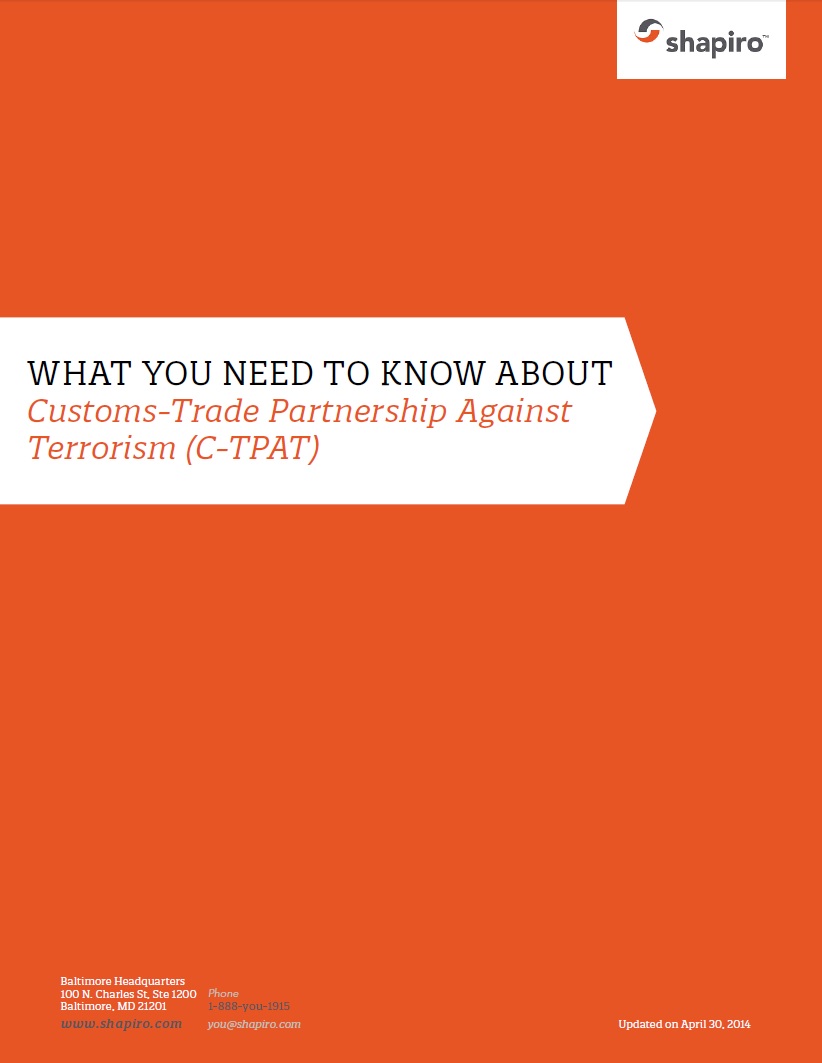What is CTPAT?
The Customs-Trade Partnership Against Terrorism (CTPAT) program is a voluntary initiative designed by U.S. Customs and Border Protection (CBP) that focuses on the development of cooperative relationships between Customs and the business community. The goal of this program is to strengthen the security of our borders as well as the security of the overall supply chain while facilitating the flow of legitimate trade.
CTPAT offers businesses an opportunity to play an active role in the war against terrorism. By participating in this first worldwide supply chain initiative, companies will ensure a more secure supply chain for their employees, suppliers, and customers.
What are the Benefits to CTPAT members?
CBP offers the following benefits to CTPAT members:
- A reduced number of inspections and reduced border wait times – certified CTPAT partners are 5 times less likely to receive Customs examinations even while the overall exam rate has increased in recent years.
- A supply chain specialist to serve as the CBP liaison for validations, security issues, procedural updates, communication, and training.
- Access to member status through the Status Verification Interface.
- Self-policing and self-monitoring of security activities.
- CTPAT-certified importers receive targeting benefits by receiving a “credit” via the CBP targeting system.
- Certified CTPAT importers are eligible to access the FAST lanes on the Canadian and Mexican borders.
- Certified CTPAT importers are eligible for the Importer Self-Assessment Program (ISA) which results in removal from the pool for Focused Assessment.
- Up to 50% penalty mitigation for Importer Security Filing (ISF) 10+2 penalties.
- Consideration for penalty mitigation for Bio-Terrorism Act-related penalties.
- Highway carriers, on the Canadian and Mexican borders, benefit from their access to expedited cargo processing at designated FAST lanes. These carriers are eligible to receive more favorable mitigation relief from monetary penalties.
- Mexican manufacturers benefit from their access to expedited cargo processing at the designated FAST lanes.
- All certified companies are eligible to attend CBP-sponsored CTPAT conferences.
- Access to the CTPAT Public Document Library Board where Customs will share best practices among members, as well as the CTPAT Partner Direct Messaging communications platform and CTPAT Partner Document Exchange via the CTPAT Portal.
- Validated participants receive even fewer inspections. If your shipment is selected for examination, your container will receive priority and move to the front of the line.
- For those validated participants who exceed the minimum security standards and employ best practices, Customs is promising a true “green lane” with no security inspections and infrequent random inspections. Containers to be inspected will move to the front of the line.
- If you have multiple containers on a bill of lading and one is selected for the exam, CBP will allow the other containers to be pulled from the pier, thus saving costly demurrage charges.
- Lets importers establish a relationship with Customs without the specter of regulatory audit issues.
- Offers a unique opportunity to participate in the process with the government.
Other benefits companies have realized by participating in CTPAT include:
- The incorporation of good sound security practices and procedures into existing logistical management methods and processes
- Enhanced integration of purchasing, transportation, and receiving processes
- Greater supply chain integrity
- A closer relationship with business partners
- Reduced inventory cycle time due to a more efficient supply chain
- More predictable deliveries due to fewer exams
- Reduced cargo theft and pilferage
- Stronger brand name protection
- Improved asset utilization
- Greater efficiency between internal and external functions
- Improved security for their workforce
- Safer, more secure working environment
- Improved marketability
- Enhanced public image
- Understanding the end-to-end process, including knowing each entity along the supply chain
According to a report from the IBM Center for the Business of Government, participation provides direct and collateral benefits in the following areas: asset visibility and tracking, personnel security, physical security, standards development, supplier selection and investment, transportation and conveyance security, building organizational infrastructure awareness and capabilities, collaboration among supply chain parties, proactive technology investments, Total Quality Management (TQM) investments, and voluntary security compliance.
What does CTPAT Participation Require?
Businesses must apply to participate in CTPAT. Participants will sign an agreement that commits them to the following actions:
- Conduct a comprehensive self-assessment of supply chain security using the security guidelines jointly developed by Customs and the trade community. These guidelines, which are available for review on the Customs website, encompass the following areas: Business Partner Security, Container Security, Physical Access Controls, Personnel Security, Procedural Security, Security Training and Threat Awareness, Physical Security, and Information Technology Security.
- Conduct a risk assessment of your supply chain security using the 5 step risk assessment process including mapping cargo flow, conducting a threat assessment, conducting a vulnerability assessment, preparing an action plan, and documenting how risk assessments are conducted.
- Submit a supply chain security profile questionnaire to Customs.
- Develop and implement a program to enhance security throughout the supply chain in accordance with CTPAT guidelines.
- Communicate CTPAT guidelines to other companies in the supply chain and work toward building the guidelines into relationships with these companies.
- Conduct annual security assessments and maintain your CTPAT portal profile.
- Undergo CTPAT validations of your facilities and those of your foreign suppliers.
CTPAT FAQ Guide
For a full list of FAQs, visit CBP’s CTPAT Frequently Asked Questions resource page. CTPAT Resource Library and Job Aids can be found here. For information regarding compliance with ISO’s 17712 standards for high security seals, please visit CBP’s guide here.
Shapiro is a participant of the Customs-Trade Partnership Against Terrorism and we are committed to do our part to protect the supply chain from criminal activities such as drug trafficking, terrorism, human smuggling, cyber threats and illegal contraband. We strive to maintain the highest standards of quality, integrity and security in the global supply chain. Shapiro has a high standard of reasonable care and demonstrates this commitment through compliance with the Customs laws of the United States. We carefully screen and select our business partners to create a more formidable stance against unethical practices and security threats.
Our Company Treats People And Terrorism seriously.
Contact [email protected] with any CTPAT concerns.
Sincerely,

President and CEO, Shapiro

